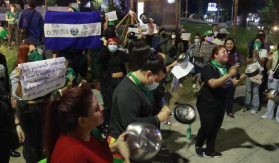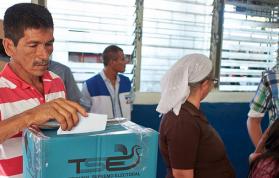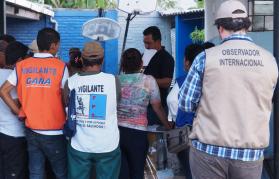Social Movement Calls for Public Debate for a Living Wage
Several of El Salvador’s leading social movement organizations are demanding a public debate in the National Minimum Wage Council as it deliberates over a scheduled cost of living adjustment to the country’s dismal minimum wage. The Salvadoran labor movement has long objected to the opaque decision-making within the Council, which is dominated by the country’s recalcitrant private sector that has fought to ensure that although El Salvador has some of the region’s highest productivity, it has some of the lowest wages.
The Council is comprised of three government, two private sector and two labor representatives, but the unions represented on the council have historically been corrupt and beholden to the powerful National Association of Private Enterprise (ANEP), which represents the country’s big business sector. Minister of Labor Sandra Guevara has emphasized the need to guarantee an open and fair process to set the minimum wage, calling on all sectors of Salvadoran society to contribute proposals to the Council. Additionally, she hosted a press conference on February 11 with the Salvadoran Social and Union Front (FSS), the Coalition for a Safe Country Free From Hunger (CONPHAS), the Union Confederation of Workers of El Salvador (CSTS), the Foundation for the Study of the Application of Law (FESPAD) and the Mélida Anaya Montes Women’s Movement (Las Mélidas) to voice support for their demand for an open, transparent process.
Currently, El Salvador has eleven different minimum wages, each varying across industries. “It’s absurd,” Abel Lara of the Salvadoran Confederation for Agrarian Reform (CONFRAS) told CISPES, “They don’t ask whether you live in the city or the country at check out at the grocery store.” A distant cry from a living wage, minimum salaries range from as low as $98/month for seasonal agricultural workers to $251/month in the service industry. Official calculations for the monthly cost of food alone for a family of four come to at least $200/month for urban residents, and $150/month in rural areas. Public sector workers make the most, after former president Mauricio Funes voluntarily raised the government’s minimum wage to $300/month, a standard that President Salvador Sánchez Cerén has maintained.
Following the Minister of Labor’s request for proposals, organized labor has called for leveling salaries across sectors to a little over $400/month. The government has presented a proposal to bring the minimum wage in rural areas up to a flat $250, and a flat $300 in urban sectors. ANEP, in turn, has proposed a 9% raise staggered over 3 years, and maintaining the differentiated wages across sectors. Maricarmen Molina of CSTS disparaged ANEP’s proposal: “The Salvadoran people should know what that increase really means: in the commercial and service industries it’s a raise of 25 cents/day; in the industrial sector it’s 24 cents/day; in the maquila sector 21 cents/day, and in the agricultural sector 12 cents/day.”
For updates on the decision, see our June post: "Salvadoran government rejects business-sector's minimum wage increase as 'mockery' to workers"

 "I am a CISPES supporter because continuing to fight for social justice and a more people-centered country means continuing the dream and sacrifice of thousands of my fellow Salvadorans who died for that vision.” - Padre Carlos, New York City
"I am a CISPES supporter because continuing to fight for social justice and a more people-centered country means continuing the dream and sacrifice of thousands of my fellow Salvadorans who died for that vision.” - Padre Carlos, New York City

